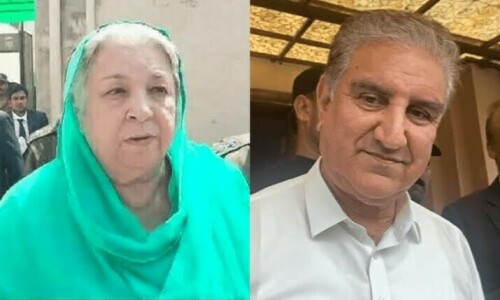WHILE many amongst us still feel nostalgic about (West) Pakistan’s being one unit, PML-N leader Makhdoom Javed Hashmi, if he could have it his way, would be satisfied with no less than 16 provinces to be carved out of the present four.
How this lonesome, tormented politician reconciles this number with provincial autonomy is hard to comprehend.
Ironically enough, the exponents of more provinces also want more powers for them. This is only one of the many contradictions in their glib campaign being run on selfish reasons. Prominent among the few who stand for retaining the present number is Balochistan’s outspoken chief minister Nawab Aslam Khan Raisani. He can foresee what most others do not: the more provinces there are, the fewer must be their powers. He would rather have one Balochistan but with greater autonomy.
The Punjab chief minister, Shahbaz Sharif, quite understandably, is opposed to the division of his province for he and his party both would be the losers. Yet, wary of opposing a populist concept, he has come up with a caveat that the basis for the creation of new provinces should be administrative and not ethnic. That is absurd, to say the least.
The province is a constitutional and legislative entity. It also represents, or is supposed to, the cultural, racial and linguistic homogeneity of the inhabitants in the context of a historical background. Systems or institutions to administer the province can be evolved to suit the convenience of the people by dividing the territory, howsoever sprawling or densely populated, without mutilating its unifying characteristics.
Administrative powers are always delegated, as indeed in the current practice, to divisions, districts, talukas, towns and villages down the line. The province essentially represents a fraternal bond that persuades the people to think and act alike for the common good.
In any case, unlike India, Pakistan has not chosen language as a defining feature in demarcating its provincial boundaries.
Uttar Pradesh (even after its hilly part was hived off to form the smaller state of Uttarakhand) still has a population (199 million) larger than Pakistan’s total of 180 million. The defining feature of UP is Urdu/Hindi as a common language.
At the other end of the Indian spectrum, Goa with fewer than two million inhabitants has not been denied provincial status merely because of its small size in the presence of other unifying factors — chiefly its historical entity as a former Portuguese colony. The division of Indian Punjab was also based on language and not because the province was too large to administer.
At first glance, Pakistan’s provincial map may look tempting for redrawing boundaries and increasing the number of provinces. But, make no mistake, it would be stirring up a hornet’s nest. It is infinitely safer to live with the present incongruities of area and population than to let personal and parochial interests run riot. New provinces should not be created only to enable the district or regional politicians to become governors or chief ministers at the expense of the people without benefiting them. In the vanguard of the provincial campaign is south Punjab which has the least justification to be a province either on grounds of economy, culture, language or any other factor. Northern Punjab, if at all, is poorer. And the relatively more developed central Punjab is in no way usurping the resources of the south which is weighed down only by its own landed elite and shrine-keepers who could become more oppressive in a province they alone dominate.
Linguistically, Punjab is one entity. The regional dialects of the Punjabi language smoothly merge into each other in their long journey from the borders of Khyber Pakhtunkhwa to Sindh. Hindko of Peshawar, Potohari of Rawalpindi, Seraiki of Multan, Jangli of the intervening wilderness and the hard-core Punjabi of Lahore are understood, if not spoken, with equal ease across 1,000 miles. In short, language is no barrier to unity nor can it be a plausible ground for dividing the province.
Even less plausible, if not outright ludicrous, is the demand for a Bahawalpur province. It is as much a part of Punjab’s variegated landscape as any other. If its claim to special status lies in being a princely state of the colonial times, the first to be considered on that ground should be Kalat which was not merely a state but a suzerain of the Baloch tribes. To this day, the Khan of Kalat asserts that the state was conquered. It did not formally accede to Pakistan.
A variety of other claims are coming up. Hazara’s is old but not troublesome. For the first time, Baloch nationalists have been heard demanding the return of their forcibly separated kin of Dera Ghazi Khan, Rajanpur and Jacobabad to the motherland. Not to be found wanting, the Awami National Party wants the Pushtu-speaking parts of Balochistan to form a separate province of ‘Southern Pakhtunkhwa’.
All these demands sound frivolous and may be so treated. But not after south Punjab becomes a province which it must one day for it enjoys the backing of the ruling party. In settling scores with Lahore’s Sharif clan, Prime Minister Yousuf Raza Gilani and the descendants of other Multan saints must not put the integrity of the country at stake. The rebels of Balochistan may be firing from their hideouts in the hills. The separatists of Sindh sit on the lifeline of the country.
kunwaridris@hotmail.com











































Dear visitor, the comments section is undergoing an overhaul and will return soon.